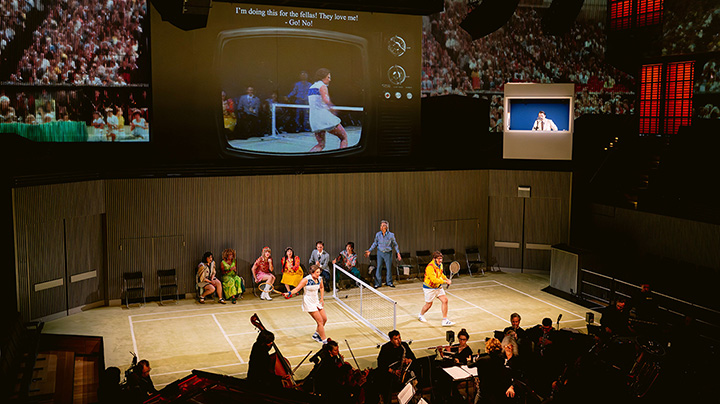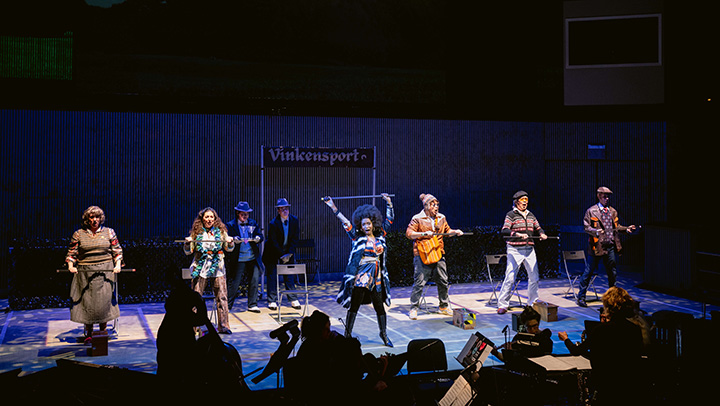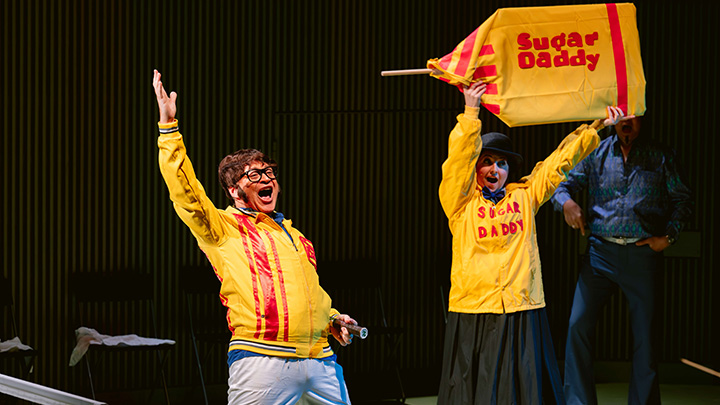
Seen at the final show on April 7, the 100-minute, intermission-less show deftly combined the West Coast premiere of the comedic one act opera Vinkensport, or The Finch Opera by 2024 Grammy nominated (for his opera film Black Lodge) composer David T. Little and librettist Royce Vavrek, with the world premiere of the one act opera Balls by 2024 Oscar nominated (for her score for American Fiction) composer Laura Karpman and librettist Gail Collins.
Vinkensport was originally commissioned by Dawn Upshaw for the Bard Conservatory Graduate Vocal Arts Program, where it received its world premiere in 2010. Little subsequently created a new version for chamber orchestra, a commission from Opera Saratoga, and it premiered there in 2018. During the pandemic in 2020, Houston Grand Opera, Austin Opera and OPERA San Antonio (as part of the Texas Opera Alliance (TOA) initiative) developed a digital production of the opera co-directed by OSA General Director E. Loren Meeker and bass-baritone Ryan McKinny and conducted by Austin Opera’s Principal Conductor Timothy Myers. The full libretto of the opera can be found here
In the program, Birds (or to be precise, VInkensport) was billed as:
“a bittersweet comedy in one act inspired by the obscure Flemish folk sport, Finch-Sitting, where trained finches race to sing the most ‘susk-e-wiets’ (the song of the birds) over the course of an hour. We see a motley assortment of contestants battle it out to see who has the most melodious bird. As they compete, the joys, sorrows, delusions, and all-too-stark realities of the finches’ trainers are revealed. We never learn the competitors’ real names, they are just defined by their birds. Some play fair, some don’t. Some just don’t even want to be there at all. But almost all are lost in the world, finding comfort in the companionship of their birds.”
In other words, the opera was less about the sport and more about the nameless trainers behind the 6 competing finches, hilariously named (from left to right) Holy St. Francis (with its pious owner who was cheated by her husband), Farinelli (the cheating trainer with CD player), Sir Elton John (the rich socialite who was forced to enter competition by her husband), Hans Sachs (the coked-up trainer who drugged up his bird), Prince Gabriel III of Belgium (with its trainer who hated the sport but obligated to preserve his neglectful father’s legacy), and Atticus Finch (the proud guy neighbor to St. Francis’ trainer).
Despite the “comedy” label, the backstories of the trainers were mostly sad, tragic even, and, similarly, Little’s score, after the exuberant opening chorus introducing the sport, permeated the air with a sense of nostalgia, almost like revery, even though it was percussion-heavy. Little gave each character their own musical characteristics; the most obvious one was reserved for Hans Sachs’s trainer’s music with its heavy-rock inclination. Little and Vavrek smartly interwove the characters’ narratives into a coherent story, oftentimes by way of the saying, “At the mercy of one-ounce opera divas,” referring to the obvious. I just wished the outlook wasn’t so gloomy! The opera ended with a somewhat hopeful note, when one of the trainers (you could probably guess which one) let go of the finch after a decade of partnership and wished the finch a good life before being “molested” by the rich socialite. It was a story for another competition, probably!
In Karpman and Collins’s Balls (no pun intended), individuality shone through as the opera painstakingly recreated “The Battle of Sexes,” the famed September 20, 1973, match between 29-year-old Billie Jean King and 55-year-old Bobby Riggs, which King won in three sets. The program notes mentioned that the match “changed not only the perception and treatment of women in sports, but significantly advanced the women’s rights movement. The opera features a live tennis match as a central narrative device, along with actual commentary from the 1973 broadcast. Balls incorporates electronic sampling laced through the score and creative time-hopping – key figures like Larry King and Howard Cosell are joined by American Suffragette Susan B. Anthony.”
There was a lot to be admired in Balls, most prominently in Karpman’s propulsive score, which almost literally became the “ball” of the show (there was not a single tennis ball shown). She masterfully perused every instrument of the orchestra, blended over a wide range of musical styles and genres (from pop, rock, jazz to a cappella chant) and developed fast-pacing rhythm to match the quick nature of the tennis movements; it was truly Karpman’s grand operatic answer to Arthur Honegger’s Rugby (It was a pity that Opera Parallèle couldn’t fit Honegger’s magnificent piece in this production)!
Dramaturgically, however, Collins’ libretto proved to be pretty problematic, as personally I felt Balls was rather overstuffed with too many agendas that ironically diluted the central message of how the match advanced women’s right movement. As mentioned above, not only did Susan B. Anthony make an appearance (as a phantom-like supporter from the past), but the opera also found the time between the sets to highlight King’s marital issues with her then-husband Larry King, and even let King’s secretary (and secret lover) Marilyn Barnett sang an aria about wishing to share a house with King in Malibu! On the other hand, the need to faithfully reconstruct the game – from when King fell behind 3-2 in the first set to a large chunk of the third set – unfortunately created some moments of monotonous repetitions, no matter how hard Karpman varied her score each time.
Combining such an introverted piece like Vinkensport with this explosive one truly required considerable skills, and it was truly a testament to Creative Director Brian Staufenbiel’s ingenuity that Birds & Balls worked together seamlessly (without intermission!). Staunfenbiel framed the production as a showing of ABC “Wide World of Sports” broadcast with Howard Cosell, with each opera represented an episode of it (Artistic Director and conductor Nicole Paiement added incidental music in between). Meticulously Staufenbiel detailed the broadcast as if it traveled to Belgium for Birds portion and particularly to SFJazz Astrodome for Balls (the actual game was played at Houston Astrodome). In addition, he worked closely with Projection Designer David Murakami to expand the boundary of Miner Auditorium; in Birds, he used the projections to show the inner thoughts of each trainer (most memorably in showing how St. Francis’ trainer’s husband cheated on her at the kitchen table!). Even more impressive was Murakami’s projections for Balls, where he projected the audience on the wall to make the hall feel many times bigger.
The projection was also used to showcase videographer Lawrence Dillon’s “interviews” with Cosell, just like in real tournaments. Costume designer Y. Sharon Peng and lighting designer Mextly Couzin completed the creative team with their significant contributions in providing genre-appropriate outfits (I couldn’t help thinking that Peng borrowed some costumes from the musical Hair for the Vocal Quartet of Balls) and beautifully bright stage (especially during the match). The attention to detail for Balls was particularly impressive, from the way King entered the tennis court a la Cleopatra carried by four bare-chested muscle men (accompanied by Triumphal March from Aida) to Riggs’s wearing a yellow Sugar Daddy jacket during the match.
As impressive as the production was, I found the musical aspects to be even more rewarding. Paiement led the Orchestra in a reading that was brilliantly vivid and full of splendor; in her hands, both operas came alive. She expertly navigated among the ever-changing rhythms and musical genres with full control and confidence. Furthermore, she was clearly passionate about the pieces, and she was noticeably having fun conducting them. She even participated in the “interview” during the ads section of Balls (obviously rooting for King)! Similarly, the same passion emanated from pretty much every member of the Orchestra, lifting the performance to a higher level.
Opera Parallèle assembled a handsome cast of 12 to present the double-bill, many of whom were making their debuts with this production. Given the nature of the presentation, it wasn’t surprising that everyone in the cast were mic’ed. Nevertheless, the cast blended as a team, and they were uniformly excellent. Many of the cast members had roles in both operas.
In Birds, the three sopranos Jamie Chamberlin, Chelsea Hollow, and Shawnette Sulker dazzled as the trainers of, respectively, Holy St. Francis, Farinelli, and Sir Elton John. Chamberlin alternated between sadness and hope describing her husband’s infidelity and her attraction to Atticus Finch’s trainer. Hollow brought a much-needed comic relief in her story about Farinelli’s death and her subsequent cheating with a CD player, and Sulker was a hoot portraying the drunken rich socialite trasing a trip to Hong Kong for an appearance at the competition (later she traded that for dignity as Susan B. Anthony). The male counterparts were equally impressive in their smaller roles, from Nathan Granner’s manic energy as the drugged-up trainer, to Chung-Wai Soong’s negativity for the sport and Daniel Cilli’s heartfelt soliloquy at the end.
Second year Adler Fellows Nikola Printz embodied King wholeheartedly, bringing a round full voice to the character and demonstrated a full commitment for the demands of miming the action (of playing tennis). It was a very physical role that Printz excelled superbly; her many cries of “Pressure” were deeply felt and almost heartbreaking. Similarly, with a booming voice, Granner boasted and taunted as the chauvinistic Riggs, fully committed to the demanding role. In a short but scene-stealing role, soprano Tiffany Austin mesmerized as the lovelorn Barnett.
It was truly a pity that the run for this production was over, but congratulations were in order for everyone involved here for such a well-done and thought-provoking show. The audience on Sunday was very appreciative and they cheered heartily for each cast member. Opera Parallèle’s final show this season will be Gregory Spears and Greg Pierce’s Fellow Travelers, based on Thomas Mallon’s novel (the same basis for the Showtime miniseries). It will be presented on June 21-23 at Presidio Theatre and will surely deserve your attention!
Photos: Kristen Loken




























Comments